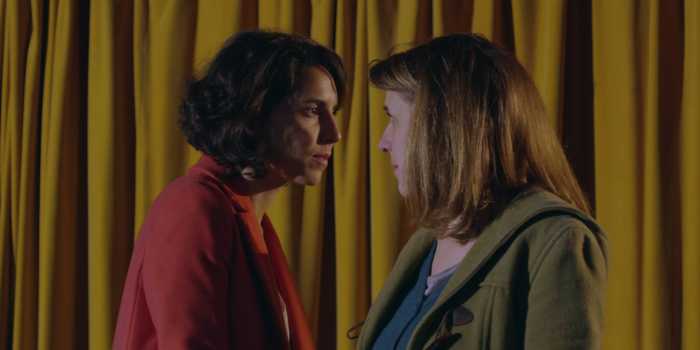The New York Film Festival celebrates its 60th anniversary this year. As this fall ritual rolls around again, it raises the question of what the new status quo for New York’s film scene might be. Multiplex screenings of all but the most popular films are desolate, while US distribution of subtitled films, at least in theaters, has practically dried up.
As the film industry values North America’s fall festival season as promotion for their Oscar contenders, how much do the Oscars themselves mean these days? While the answers may take years to settle out, the 2022 selection puts several queer-themed films in a prominent place. The Main Slate’s Centerpiece is Laura Poitras’ documentary on bi photographer and activist Nan Goldin, “All the Beauty and the Bloodshed,” while the director Elegance Bratton’s autobiographical film about a gay Black man who enlists in the Marines, “The Inspection,” closes out the festival.
Elsewhere, queer directors Ashley McKenzie, Albert Serra and Joao Pedro Rodrigues turned in adventurous work, and gay director James Ivory makes his debut as a documentarian at 94. Closer to the mainstream, the festival also previews “Call Me By Your Name” director Luca Guadagnino’s bisexual cannibal opus “Bones and All” and Todd Field’s comeback “TAR,” which examines a famed lesbian composter’s post-#metoo sex scandal.
Ashley McKenzie makes films grounded in a specific, somewhat isolated place: the island of Cape Breton off the coast of Nova Scotia. Her 2017 debut, “Werewolf,” followed a couple of people addicted to opioids, while her long-awaited second feature, “Queens of the Qing Dynasty,” traces a friendship between a young woman confined to a psychiatric hospital and a genderqueer Chinese college student. At the start of “Queens of the Qing Dynasty,” Star (Sarah Walker) swallows poison in a suicide attempt. She has such severe mental health problems that she’s incapable of living on her own. An (Ziyin Zheng) has recently arrived to attend university in Cape Breton; as a hospital volunteer, they meet Star.
Shot in 1.33 aspect ratio, “Queens of the Qing Dynasty” rarely leaves the hospital or lets much color into its world. McKenzie frames her actors’ faces in close-up against dreary white backgrounds. A few glimpses of animation and a trip to a VR arcade provide the only glimpses of color. (Despite the fact that Star is asexual and An is attracted to men, she suggests the two get married to solve An’s immigration issues.) Walker gives an excellent performance, especially potent since her face fills the screen so much of the time. Deeply melancholy without being hopeless, “Queens of the Qing Dynasty” creates a new form for the “queer friendship romance.”
Find showtimes, screening locations and tickets here.
Despite his power as a French government official on a Polynesian island, De Roller (Benoit Magimel) spends “Pacifiction” lazing around at nightclubs, constantly wearing shades, a gaudy shirt, and a white suit, like the ghost of Graham Greene. (The film was inspired by the memoir of Marlon Brando’s Tahitian wife Tarita Teìriipaia.) He’s attracted to trans dancer Shannah (Pahoa Mahagafanau), although the extent of their relationship remains unclear, and a homoerotic undercurrent pervades the film’s glimpses of club life.
While you can sense Serra trying to reach a wider audience than usual, with thriller trappings and a handsome movie star at the center, it still plays like a movie reconstructed after most of the first cut was deleted. “Pacifiction” spends two hours seeming as relaxed as De Roller, then moves into more mysterious ground. In an interview with Emmanuel Burdeau, Serra said “I’m only interested in images,” and he stays true to that ethos (although he’s leaving out the care that went into the film’s sound design).
The last third of the film is mostly concerned with creating indelible and cryptic but faintly sinister combination of music — it’s full of songs combining blown-out electronic drones with reggae beats — and visuals: De Roller standing in a empty football field at night as rain pours into his open mouth, a French sailor dancing under blazingly stark blue light. For better or worse, it feels like the spectator is living in real time with De Roller, peak moments balanced with longueurs. Fittingly, “Pacifiction” adjusts to the rhythm of its setting: colonialism glowing in the dark.
Showtimes, screening locations and tickets here.
“Becoming Male in the Middle Ages” is a sci-fi miniature set in a near-future Portugal where beef is grown in labs and cis men can become pregnant by being implanted with embryos. (22 minutes long, it plays with Jonas Trueba’s medium-length “You Have to Come and See It.”) The film relates the fertility struggles of two couples, one heterosexual and one gay. André learns that he’s infertile, possibly due to plastic pollution, while Vicente’s body seems to resist pregnancy despite his repeated injections with embryos all over his body. The cinematography contrasts a pale, clinical sterility with walks in green parks filled with singing birds. It crams a great deal of storytelling into a short runtime, without coming to any grand conclusions except that future technology is likely to disappoint and fail us, as much as it may offer new possibilities for our bodies.
Showtimes, screening locations and tickets here.
The festival’s other Portuguese sci-fi entry, Joao Pedro Rodrigues’ “Will-o’-the-Wisp,” aims much higher but winds up scattershot and flaky. It contains enough intriguing material — several musical numbers, a dry wit, and not least, firefighter fetishism and flirtations with porn — that its flaws ache. In 2069, Portugal’s King Alfredo (Joel Branco) lies on his deathbed. “Will-o’-the-Wisp” then takes us back to his days as a young man (played by Mauro Castro) in the 2010s, when he aspired to become a volunteer fireman. He becomes enamored with his Black colleague Afonso (André Cabral). But royalty prevents him from truly living as an ordinary person or disavowing Portugal’s history of racism and colonialism. Perhaps there’s a political purpose to the film’s refusal to cohere into a satisfying whole, but its arch humor too often congeals into a smirk. At 67 minutes, including credits, it ends too quickly and abruptly.
Showtimes, tickets and screening locations here.
60th New York Film Festival |Sept. 30th-Oct. 16th |Film at Lincoln Center, various locations | Lineup, schedule and tickets available at https://www.filmlinc.org/nyff2022/




































